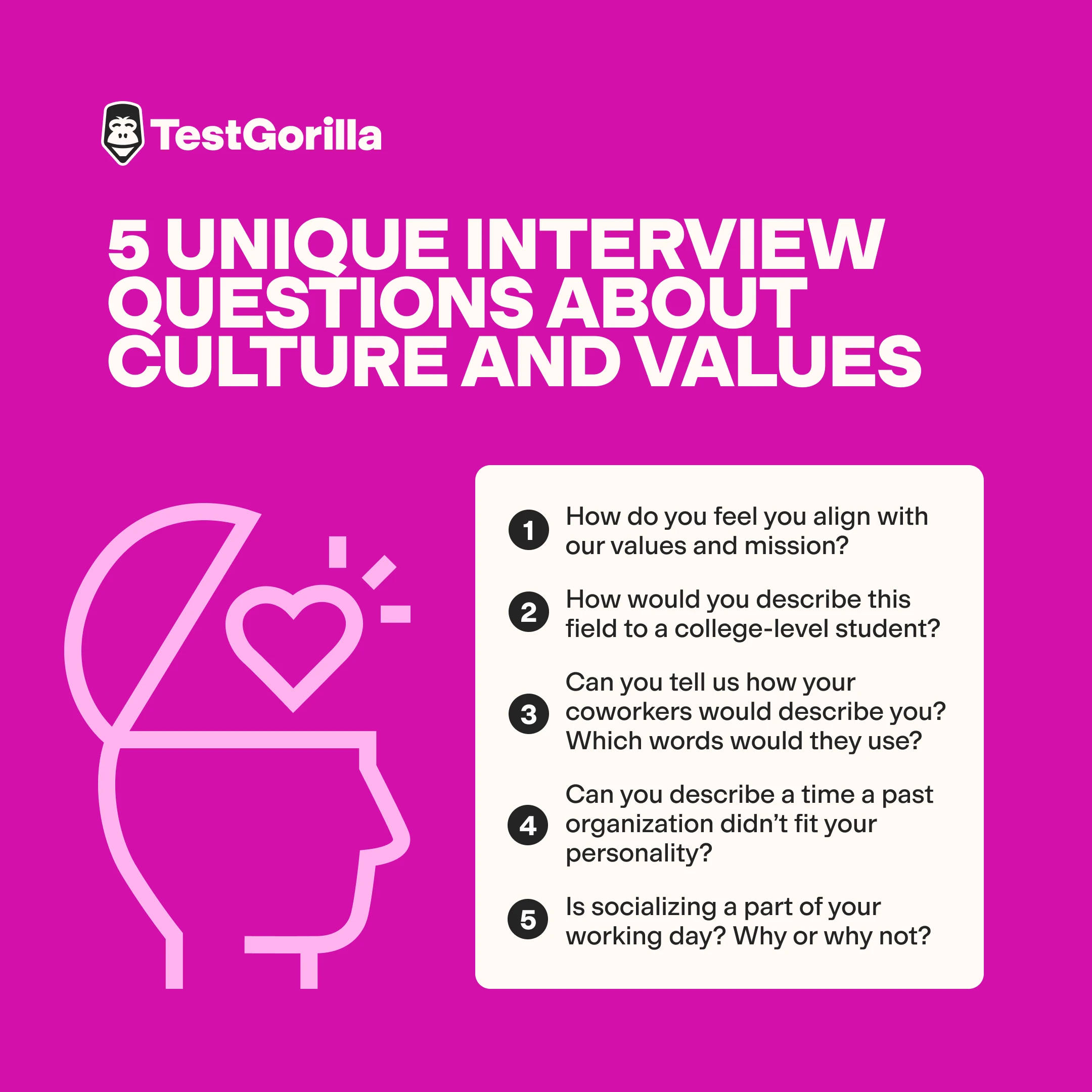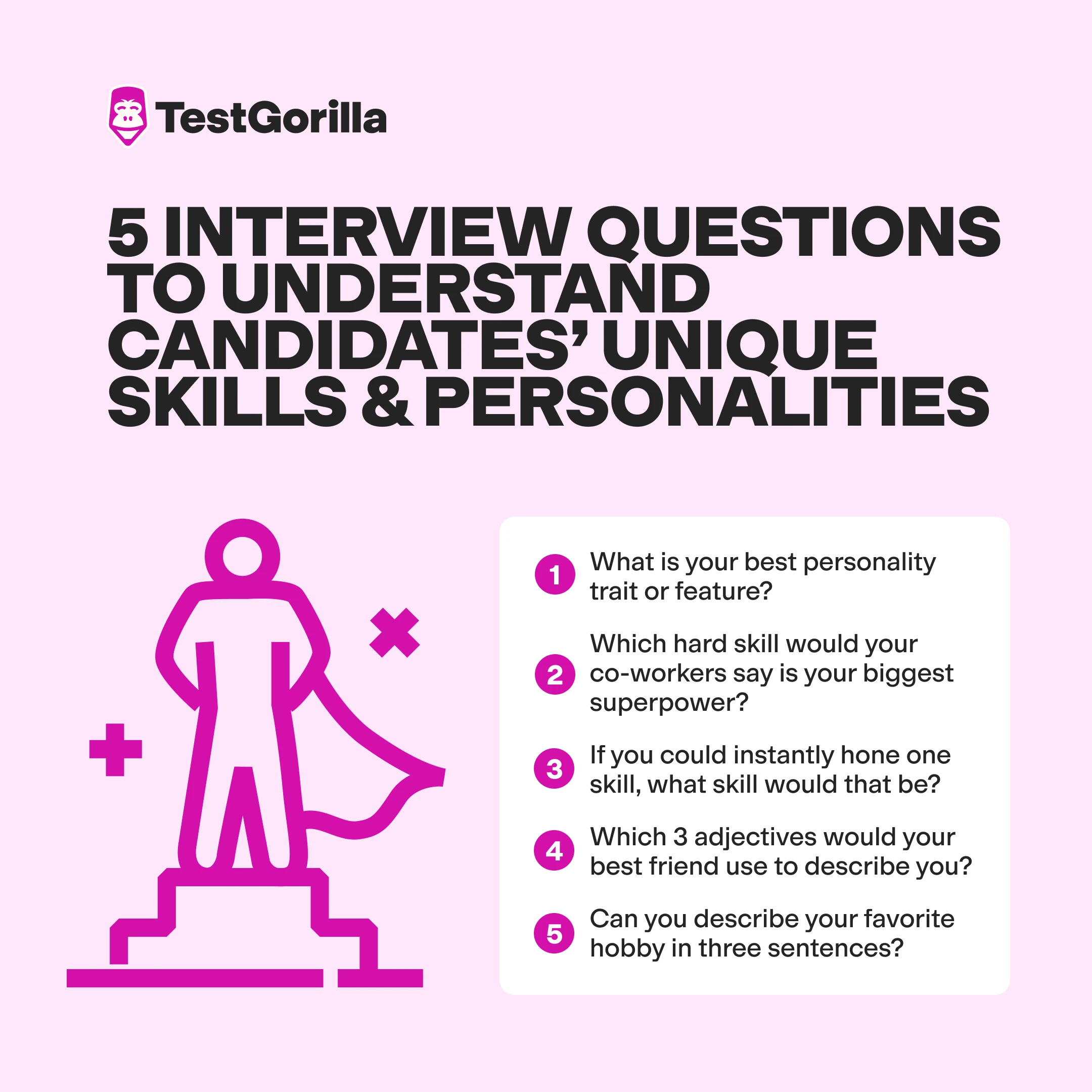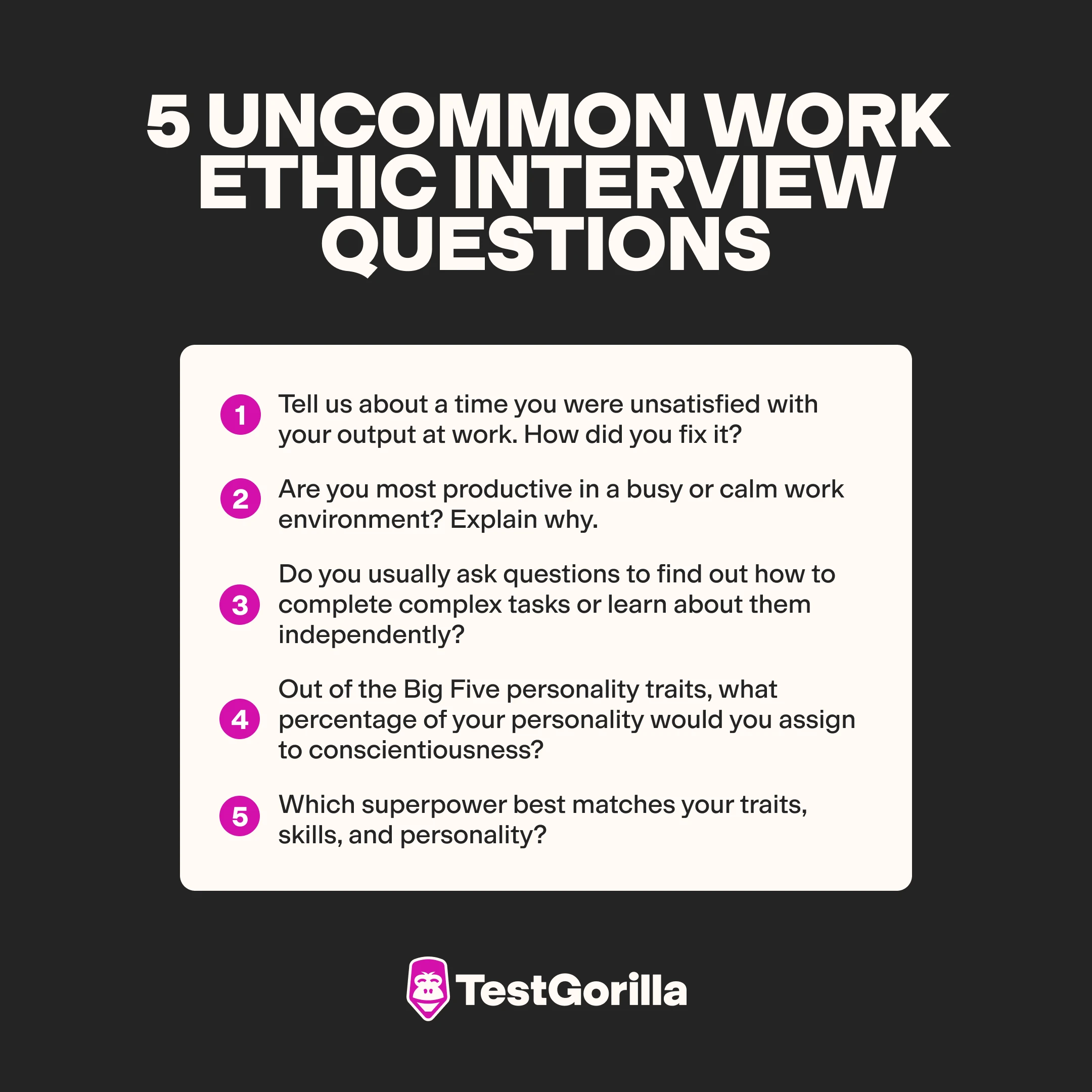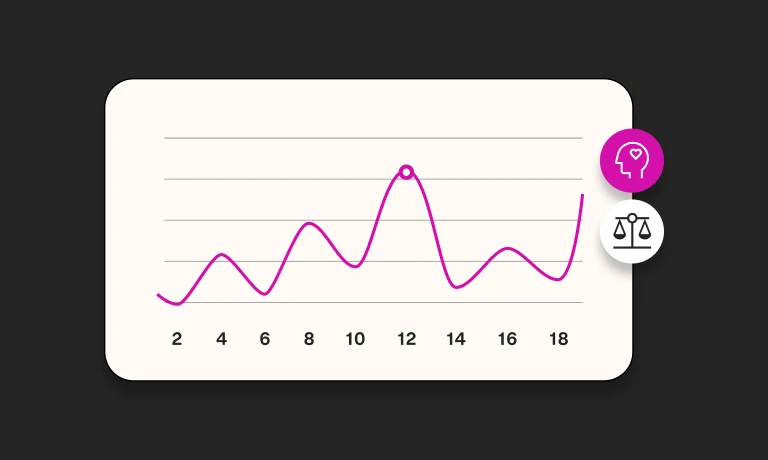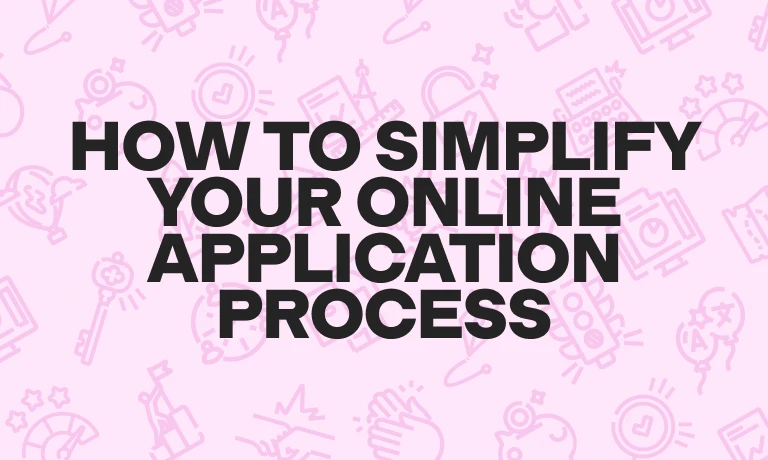25 unique interview questions to learn more about top talent
Invite only the best candidates to the interview stage
The most common interview questions simply test a candidate’s ability to parrot canned answers. Meanwhile, opting for more unique interview questions gives applicants a chance to show off their critical thinking skills and personality traits.
But as a recruiter, coming up with creative interview questions to illuminate the right aspects of a candidate for your open role is tough. That’s why we’ve compiled a list of 25 unique interview questions and answers to help you get started on your recruitment initiative.
Along the way, we’ve also sprinkled in interview tips to guide your thought process when constructing and conducting interviews for your next new hire.
Table of contents
- 10 unique interview questions to break the ice
- 5 unique interview questions about culture and values
- 5 clever, creative interview questions to understand candidates’ unique skills and personalities
- 5 uncommon work ethic interview questions
- Use talent assessments to get the most out of interviews
- Combine unique interview questions with targeted skills testing to hire the best
10 unique interview questions to break the ice
It’s best to start the interview process with some icebreaker questions to help you learn about candidates right at the beginning in a playful and non-intimidating way.
This shows candidates that you’re not trying to trip them up and enables them to relax, giving them a better chance of showing off their skills.
Ask candidates a selection of these 10 uncommon interview questions to discover something new about them instantly:
What is your favorite animal, and why?
Which fictional character would you aspire to emulate?
How would you describe your last job to a five-year-old?
What two items would you take to a deserted island?
Where would you go if you could travel to any destination on Earth?
Would you like to learn a new language?
What approach do you take to work hard and play hard?
Which factors inspired you to join this field?
What gift would someone buy you if they knew you well?
What gift would you buy someone else?
This type of question is intended to be easy yet thought-provoking. Although the content of the responses may be ultimately inconsequential, observing how quickly the interviewee settles into the interview may provide valuable insights into their worker agility.
5 unique interview questions about culture and values
One of the most important factors in whether a candidate is right for a role is if their values align with your company’s culture. But the same old questions won’t cut it – here are unique interview questions to ask employees to find out if they can add to your organization.
1. How do you feel you align with our values and mission?
A massive 86% of job seekers research companies online when deciding to apply during their job search.
The best ones show they understand and connect to your positive values – for instance, if your company values include transparency and honesty, the candidate might give an example of when they have adhered to these values.
For best results, include a Culture Add test in your screening evaluations to examine whether a candidate’s values align with your organization’s values, then use this unique interview question to dig deeper.
Here’s an example result from a Culture Add test:
In this case, we can see that the candidate has selected six traits the employer has marked as important. You can dig deeper in two ways:
By asking more about the values you share and why they think they are important.
By asking about the values – such as commitment – that are not as important to you, and why they have chosen them. Some candidates might hold values that are not important to your overall organization but inform their work positively; keep an open mind when listening to their answers.
Find candidates who align with your values.
Discover how TestGorilla’s Culture Add and personality tests can uncover top talent.
2. How would you describe this field to a college-level student?
Knowing whether your applicants are familiar with the field they work in is essential. It indicates their level of competency and helps you learn if their familiarity matches your expectations.
They should be able to identify where the introductory concepts end and where the expert concepts begin, and this unique question tests how well they can straddle that line when communicating with coworkers from other departments.
Experienced candidates may mention the skills the field requires and the responsibilities that workers handle. Of course, each response depends on the specific field your open role belongs to.
3. Can you tell us how your coworkers would describe you? Which words would they use?
When evaluating candidates’ answers to clever interview questions on this topic, consider if the words align with the organization’s values.
Look for positive adjectives or phrases that show they can fit in your company’s work environment.
Some candidates might be creative, which is beneficial for content writing or marketing roles. Others might be detail-oriented, which is ideal for accounting or proofreading jobs.
However, continue to be open-minded about how unexpected traits could benefit a role in unique ways, and consider asking follow-up questions on how they think those traits would help in this new job.
4. Can you describe a time a past organization didn’t fit your personality?
You can use Enneagram tests to explore how the candidate might change your team dynamic, but this question helps you dig further, understanding more about the organizations and teams that don’t align with the candidate’s personality.
Applicants might mention factors like:
A competitive or sales-focused environment
A highly independent way of working
A “creative” approach to project management that lacked clear processes
If they mention something similar to your own company not being a good cultural fit for them, that may be a red flag.
5. Is socializing a part of your working day? Why or why not?
This is an adaptation of the frequently asked question: “Do you prefer working as an individual or as part of a team?”
It is crucial because understanding whether your candidates’ collaboration style extends to social events may help you learn more about team dynamics and build a team that excels.
Socializing can enhance productivity, but listen out for responses that indicate they can also balance socializing at work with their workplace duties.
They may even draw a hard line between social relationships and professional relationships, hinting that their reluctance to socialize wouldn’t impede their capacity for teamwork.
The best insights on HR and recruitment, delivered to your inbox.
Biweekly updates. No spam. Unsubscribe any time.
5 clever, creative interview questions to understand candidates’ unique skills and personalities
Some of the most unique interview questions you can ask focus on uncovering the distinctive features of your candidates’ personalities and skillsets.
Here are five unique interview questions for managers to ask to understand candidates as individuals.
1. What is your best personality trait or feature?
When responding to this unique interview question, candidates may mention soft skills such as clear communication or personality traits like a sense of humor.
This question not only gets the candidate to share what they’re most confident in; it also reveals which trait they find most valuable to share, which can tell a lot about how well the candidate’s values align with your company’s.
Also, consider whether their best trait or feature helps with the work they will do for your organization. For instance, a content writer may explain that their best trait is their curiosity and research ability – both important soft skills in their industry.
2. Which hard skill would your co-workers say is your biggest superpower?
Candidates’ answers to unique job interview questions on this subject may vary depending on your applicant’s field of work. “Superpower” is a strong term, so a candidate who doesn’t hesitate to answer this is confident in their abilities
A receptionist may explain that their co-workers consider their customer service skills a superpower. A salesperson may mention that their superpower is B2B sales.
Always listen for responses that indicate how applicants are uniquely talented in such skills – for example, describing a complex situation they handled using this skill.
3. If you could instantly hone one skill, what skill would that be?
From learning a new language (coding or spoken) to learning how to surf to perfecting musical talents, there are many skills your applicants could consider valuable.
Answers to this question reveal whether your applicants have any hidden talents or traits, such as creativity, perseverance, or artistic expertise. It also helps you get to know your applicants and discover their interests outside of work.
Pay particular attention to the part of the applicant’s life their answer pertains to. Is it a personal endeavor, or is it a work-related skill that hints at bigger career goals? Could this be a new skill they could actually pick up on the job during their professional development?
4. Which 3 adjectives would your best friend use to describe you?
You may receive many responses to this unique interview question but listen for positive adjectives that align with your organization’s values.
For instance, if one of your core values is commitment, candidates who respond to the question by mentioning determination may be valuable.
However, be prepared for seemingly negative responses intended to be endearing in only the way best friends can be – words like “smartass,” which could indicate them being highly detail-oriented with the confidence to call out mistakes when they see them.
5. Can you describe your favorite hobby in three sentences?
Candidates may describe a range of hobbies but look for concise answers. By asking candidates to respond using three sentences, you can test their communication skills and ability to explain their hobbies and why they enjoy these activities clearly.
Watch out for “hidden” skills that the hobby requires that the interviewee neglected to mention elsewhere. They may not have had to use these skills in a work environment and could be unaware of how valuable they can be for a new position.
For example, a candidate who discusses their love of chess could have hidden talents in their planning and problem-solving skills.
5 uncommon work ethic interview questions
A whopping 85% of employers consider work ethic an important trait in employees. Assess whether candidates have the drive you need by asking work ethic interview questions like the questions below.
1. Tell us about a time you were unsatisfied with your output at work. How did you fix it?
It’s normal to experience dissatisfaction when tasks don’t go to plan, but it’s also important to check whether applicants can fix their work or learn to avoid errors and stay productive.
Candidates can also talk about feedback when responding to this interview question. The best answers acknowledge that constructive criticism can enhance an employee’s output and ensure they satisfy clients or customers.
2. Are you most productive in a busy or calm work environment? Explain why.
Although some applicants are productive in a calm environment, others might work well under pressure and prefer a busy one.
The best way to assess your candidates’ responses is to check if their preferences match your company’s environment. If your organization’s work is fast-paced, you should look for candidates with a preference for working in this type of atmosphere.
3. Do you usually ask questions to find out how to complete complex tasks or learn about them independently?
Candidates should understand that combining independent work and collaborative methods can help employees complete complex tasks.
In fact, experts suggest that asking questions can invite team members to deepen or broaden their thinking. Look out for applicants who can give examples of when they ask good questions when learning and how they justify their approach.
4. Out of the Big Five personality traits, what percentage of your personality would you assign to conscientiousness?
This question draws on the Big Five (OCEAN) personality model, which describes personalities as a combination of five traits:
Openness to experience
Conscientiousness
Extroversion
Agreeableness
Neuroticism
It’s important to single out conscientiousness when asking work ethic interview questions because research shows a positive link between conscientiousness and job satisfaction.
This question can help you discern whether a candidate has a long-term future at your company.
This question also helps you assess candidates’ self-awareness and honesty because you can compare their answers with their results on the Big Five (OCEAN) test if you include it in the screening stage.
Hire candidates with a strong work ethic quickly and easily.
Screen candidates with the Big Five (OCEAN) test and other tests for free today.
5. Which superpower best matches your traits, skills, and personality?
As opposed to the earlier question about superpowers, this one pertains to imaginary powers that complement or represent their skills, not a description of their skills as superpowers.
If a candidate is a perfectionist or focuses on the smallest details of a project, they might mention that these traits are like having X-ray vision. If a candidate completes work quickly, they might correspond these skills to super speed.
This question can also help you assess a candidate’s self-awareness when you compare their own assessment of their strengths with their performance on skills tests.
Use talent assessments to get the most out of interviews
To maximize the effectiveness of your unique job interview questions, use skills testing to screen candidates.
Unlike resume evaluation, skills testing enables hiring managers to directly and objectively observe candidates’ skills, quantify them, and create a shortlist without being influenced by bias.
It ensures that all interviewees have the core skills required by the job description before you invite them to interview. This, in turn, means that you can spend more time crafting unique interview questions to ask candidates to delve deeper into these skills and how they envision their future at your company.
Skills tests aren’t limited to hard skills, either. You can also measure candidates’ qualitative traits, such as their motivation and personality type.
For example, you could use the DISC test to get an idea of a candidate’s personality traits and how they express emotions based on four behavior types:
Dominance
Influence
Steadiness
Conscientiousness
Here’s an example question:
In this example, you could then spend the time you saved on reading resumes to think of creative questions to ask in an interview to:
Explore a candidate’s self-awareness by checking whether they accurately assess their own personality type
Understand how their personality traits help or hinder them in their role
Check their alignment with your company culture and values
This makes your hiring process more effective and much faster. Just ask Revolut: The disruptive banking app cut time-to-hire by 40% when it switched to TestGorilla for hiring.
Switch to skills testing to cut your time-to-hire.
Explore TestGorilla’s skills tests and shortlisting tools.
Combine unique interview questions with targeted skills testing to hire the best
Coming up with creative interview questions to ask in an interview is no easy feat. In this article, we’ve shown that by switching to skills testing to screen candidates, you can save time establishing candidates’ skills and spend time digging for deeper insights.
We’ve even listed 25 creative questions for an interview to help get you started, including work ethic interview questions and clever interview questions to assess culture.
Now it’s over to you.
To explore our testing platform for yourself, take a product tour.
To get started right away and find out how our skills testing platform could work for your organization, sign up for a Free forever plan now.
You've scrolled this far
Why not try TestGorilla for free, and see what happens when you put skills first.



